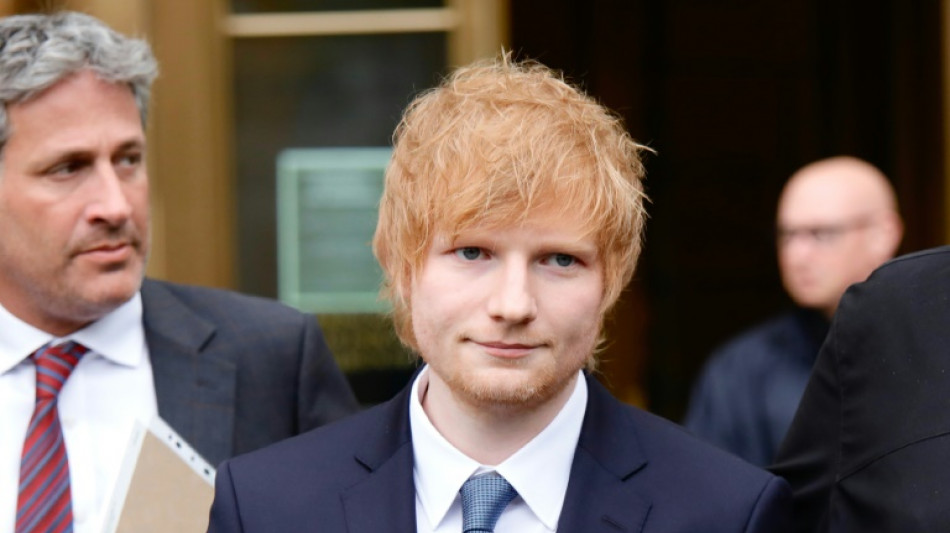
-
 Teen Konstas to open for Australia in Boxing Day India Test
Teen Konstas to open for Australia in Boxing Day India Test
-
Asian stocks mostly up after US tech rally

-
 US panel could not reach consensus on US-Japan steel deal: Nippon
US panel could not reach consensus on US-Japan steel deal: Nippon
-
The real-life violence that inspired South Korea's 'Squid Game'

-
 Blogs to Bluesky: social media shifts responses after 2004 tsunami
Blogs to Bluesky: social media shifts responses after 2004 tsunami
-
Tennis power couple de Minaur and Boulter get engaged

-
 Supermaxi yachts eye record in gruelling Sydney-Hobart race
Supermaxi yachts eye record in gruelling Sydney-Hobart race
-
Hawaii's Kilauea volcano erupts, spewing columns of lava

-
 El Salvador Congress votes to end ban on metal mining
El Salvador Congress votes to end ban on metal mining
-
Five things to know about Panama Canal, in Trump's sights

-
 NBA fines Minnesota guard Edwards $75,000 for outburst
NBA fines Minnesota guard Edwards $75,000 for outburst
-
Haitians massacred for practicing voodoo were abducted, hacked to death: UN

-
 Inter beat Como to keep in touch with leaders Atalanta
Inter beat Como to keep in touch with leaders Atalanta
-
Mixed day for global stocks as market hopes for 'Santa Claus rally'

-
 Man Utd boss Amorim questions 'choices' of Rashford's entourage
Man Utd boss Amorim questions 'choices' of Rashford's entourage
-
Trump's TikTok love raises stakes in battle over app's fate

-
 Is he serious? Trump stirs unease with Panama, Greenland ploys
Is he serious? Trump stirs unease with Panama, Greenland ploys
-
England captain Stokes to miss three months with torn hamstring

-
 Support grows for Blake Lively over smear campaign claim
Support grows for Blake Lively over smear campaign claim
-
Canada records 50,000 opioid overdose deaths since 2016

-
 Jordanian, Qatari envoys hold talks with Syria's new leader
Jordanian, Qatari envoys hold talks with Syria's new leader
-
France's second woman premier makes surprise frontline return

-
 France's Macron announces fourth government of the year
France's Macron announces fourth government of the year
-
Netanyahu tells Israel parliament 'some progress' on Gaza hostage deal

-
 Guatemalan authorities recover minors taken by sect members
Guatemalan authorities recover minors taken by sect members
-
Germany's far-right AfD holds march after Christmas market attack

-
 European, US markets wobble awaiting Santa rally
European, US markets wobble awaiting Santa rally
-
Serie A basement club Monza fire coach Nesta

-
 Mozambique top court confirms ruling party disputed win
Mozambique top court confirms ruling party disputed win
-
Biden commutes almost all federal death sentences

-
 Syrian medics say were coerced into false chemical attack testimony
Syrian medics say were coerced into false chemical attack testimony
-
NASA solar probe to make its closest ever pass of Sun

-
 France's new government to be announced Monday evening: Elysee
France's new government to be announced Monday evening: Elysee
-
London toy 'shop' window where nothing is for sale

-
 Volkswagen boss hails cost-cutting deal but shares fall
Volkswagen boss hails cost-cutting deal but shares fall
-
Accused killer of US insurance CEO pleads not guilty to 'terrorist' murder

-
 Global stock markets mostly higher
Global stock markets mostly higher
-
Not for sale. Greenland shrugs off Trump's new push

-
 Sweden says China blocked prosecutors' probe of ship linked to cut cables
Sweden says China blocked prosecutors' probe of ship linked to cut cables
-
Acid complicates search after deadly Brazil bridge collapse

-
 Norwegian Haugan dazzles in men's World Cup slalom win
Norwegian Haugan dazzles in men's World Cup slalom win
-
Arsenal's Saka out for 'many weeks' with hamstring injury

-
 Mali singer Traore child custody case postponed
Mali singer Traore child custody case postponed
-
France mourns Mayotte victims amid uncertainy over government

-
 UK economy stagnant in third quarter in fresh setback
UK economy stagnant in third quarter in fresh setback
-
Sweden says China denied request for prosecutors to probe ship linked to cut undersea cables

-
 African players in Europe: Salah leads Golden Boot race after brace
African players in Europe: Salah leads Golden Boot race after brace
-
Global stock markets edge higher as US inflation eases rate fears

-
 German far-right AfD to march in city hit by Christmas market attack
German far-right AfD to march in city hit by Christmas market attack
-
Ireland centre Henshaw signs IRFU contract extension


Sheeran copyright battle could stoke songwriting paranoia
Ed Sheeran is preparing for a blockbuster tour and album release amid regular trips to Manhattan's federal court, where he's defending his songwriting in a closely watched copyright case.
The trial centers on whether the British pop phenom plagiarized Marvin Gaye's 1973 soul classic "Let's Get It On" in his 2014 hit "Thinking Out Loud."
The heirs of Ed Townsend, who co-wrote Gaye's smash, are behind the civil suit, and allege "striking similarities and overt common elements" between the songs.
It's the latest in a series of high-profile music copyright cases that have the industry on edge, leaving some songwriters paranoid about their own creative processes and vulnerability to litigation.
Sheeran, 32, has spent days testifying with guitar in hand, playing demos for the court to prove the 1-3-4-5 chord progression that's primarily in question is a basic building block of pop music that can't be owned.
His legal team argues that Gaye and Townsend were far from the first to record it, citing, for example, a number of Van Morrison songs that use the sequence and that were released prior to "Let's Get It On."
It's a notion echoed by forensic musicologist Joe Bennett.
"The world I want to live in is one where nobody sues anyone for a one- or two-bar melodic or harmonic similarity, because those similarities can so easily occur through coincidence," the professor at Massachusetts' Berklee College of Music told AFP.
"They shouldn't be protectable by copyright."
The case hinges on the actual composition of the songs rather than the recorded versions -- think sheet music, not vibes.
In theory that's a specificity that could help Sheeran's case, but once a music copyright suit reaches the point of jury trial, anything can happen.
Winning demands significant funding and resources, and defendants are beholden to the volatility of opinions from jury members who almost certainly don't have a background in musicology.
Both sides have hired expert witnesses to explain the technical details to jurors, but, of course, their conclusions differ significantly.
"If you play music to a jury, it could go either way," Bennett said.
- 'Chilling effect' -
There have been a handful of landmark music copyright cases in recent years, notably in 2016 when Gaye's family -- who is not part of the New York lawsuit against Sheeran -- successfully sued the artists Robin Thicke and Pharrell Williams over similarities between the song "Blurred Lines" and Gaye's "Got to Give it Up."
The result surprised many in the industry, including legal experts, who considered many of the musical components cited as foundational, and existing largely in the public domain.
Shortly thereafter an appeals court decision confirmed Led Zeppelin's victory over a similar case centered on the classic "Stairway to Heaven" -- a boon for songwriters.
"One reason that this Ed Sheeran case may be really important to the industry is that it's a data point that would show well is the pendulum actually back on the other side, or are we just going back and forth?" said Joseph Fishman, a law professor specialized in intellectual property at Vanderbilt University.
"If it's going back and forth, that could still have a chilling effect on how songwriters write, because you never know -- is my case going to be the one?"
And unintended infringement is a weak defense: in 1976, George Harrison was found liable for "subconsciously" plagiarizing "He's So Fine" by the Chiffons for his first solo hit "My Sweet Lord."
In his memoir Harrison later wrote that he suffered a "paranoia about songwriting that had started to build up in me."
This week Sheeran told the court that fellow songwriters have told him "you have to win this for us" adding with a tone of exasperation that if the Townsend estate prevails, "I'm done."
"I find it really insulting to work my whole life... and have someone diminish it by saying that I stole it," Sheeran said on the stand Monday.
Bennett said many of his students at Berklee -- a prestigious conservatory of contemporary music -- have voiced concern over the Sheeran case, speaking as the next generation of songwriters.
One of them, 21-year-old Mary Jo Swank, told AFP that "I've definitely grown a fear that the idea of being completely original and unique is going to put the emotional and creative process of a songwriter in jeopardy."
"It'd be nice if I'd be allowed to write my take on a 1-3-4-5 progression without having to worry that it's not unique enough."
O.M.Souza--AMWN



